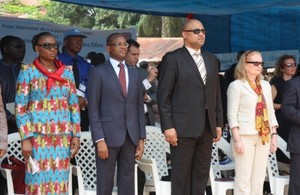New UK project in DRC to improve girls’ access to school
Launch of a new Girls' Education Challenge project in the Democratic Republic of Congo to improve Congolese girls' access to school.

From left to right: DRC Minister of Gender, Family and Child, Ms Geneviève Inagosi; DRC Minister of Primary, Secondary and Vocational Education, Mr Maker Mwangu Famba; DRC Minister of Social Affairs, Humanitarian Action and National Solidarity, Mr Charles Nawej Mundele; and the British Ambassador in DRC, Ms. Diane Corner; at the launch of the Girls' Education Challenge project in DRC.
On the 12 June 2013, a delegation of DRC Ministers, UK officials and international partners went to the Province of Equateur to launch the Girls Education Challenge project selected for the Democratic Republic of Congo (DRC). The Minister of Primary, Secondary and Vocational Education, Mr Maker Mwangu Famba, the Minister of Gender, Family and Child, Ms Geneviève Inagosi and the Minister of Social Affairs, Humanitarian Action and National Solidarity, Mr Charles Nawej Mundele, together with the British Ambassador in DRC, Ms. Diane Corner, and representatives of the implementing partners attended the launch ceremony in a school in Mbandaka, Province of Equateur.
The project “Valorisation de la Scolarisation des Filles – VAS-Y FILLE” is funded by the UK government and will work to improve access to education for more than 137,000 girls in 5 provinces of DRC where girls’ enrolment, learning and completion are the lowest. The project will be implemented by International Rescue Committee, Save the Children and Catholic Relief Services in partnership with the Government of DRC, in the provinces of Bandundu, Equateur, Kasaï Oriental, Katanga and Orientale.
It will work on 4 pillars in order to:
-
increase parental financial capacity to support girls in primary education
-
improve girls’ reading and maths skills through teacher training, tutoring and community reading programs
-
increase community involvement, ensuring girls’ access to quality education in a safe environment
-
increase civil society engagement in providing alternative learning opportunities that will allow out-of-school girls to complete primary education
The VAS-Y Fille programme has a number of innovative components, for example the VAS-Y Fille’s partnership with private-sector organisations, such as Trust Merchant Bank and Airtel; and female champions for girls’ education. These partners will help VAS-Y Fille leverage funding in order to reach more girls and provide more support to girls and their families.